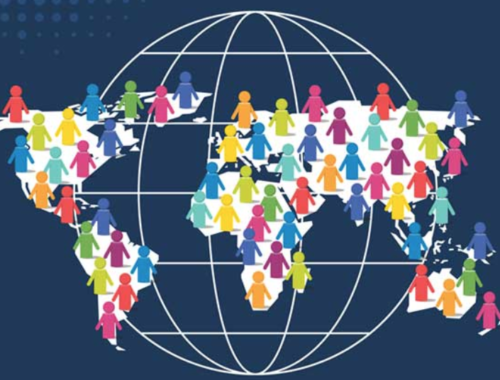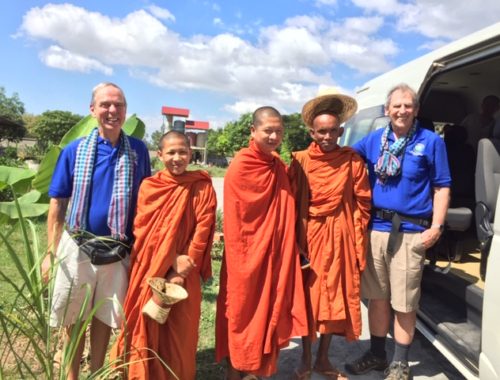The Good News About Technology

THERE IS MORE GOOD NEWS IN THE WORLD THAN BAD
“Sorry I cannot help you,” said the voice on the other end of the phone. “Let me transfer you to a person who looks after personal accounts.”
Ingrid was becoming angry. She had been on the phone for over an hour trying to find out the status of an unrecorded payment. This was her 3rd transfer. She took a deep breath and thought, “If I hang up now I will have to do this all over again. Where are the days when banking was simpler and you had one person you knew who could sort out all questions?”
The transfer of the call went through but was met by a recorded voice, “We are sorry we are busier than normal and your call will be placed in sequence.” The music was pleasant. Then, all of a sudden her phone went dead. Her cell phone battery had died. This was too much. Ingrid stood up and her face became red. Angrily she lifted her arm, about to throw the small black phone in her hand

She paused, took a deep breath, her face flushed with anger. Flashing through her mind was the realization, “If I throw this d@# thing that controls my life, it will probably break.” Gone will be access to all of my contacts, ability to text and email, research almost anything, watch movies, see and talk to many people at once on Zoom, draw, take pictures, go on apps that will tell me what birds are singing, play video games and locate people all over the world. With the realization of this, her face returned to its normal colour and her hand and phone returned to her side
Her smart phone was just one of the millions of inventions that have recently changed most people’s worlds. Some inventions make a huge impact, others not so much.
The smart phone combined with the internet and computer chip is arguably one of the major inventions of the past 30 years. In fact, cell phones’ capacity to do things keeps growing.

On your cell phone, if you have the app, you can now diagnose health problems including respiratory issues such as TB just by coughing into the phone, adjust the temperature in your house remotely and locate someone thousands of kilometers away. They have also become more plentiful. In fact, there are now more cell phones in the world than people, (over 8 billion) making them a modern necessity and the ability to operate them a necessary life skill
No wonder Apple Computer, which grew out of Steve Wozniak and Stephen Jobs’ desire to make computers small enough so people could have their own computer at home or the office, is now the second most valuable company in the world, worth an estimated $2.6 trillion
Technology has grown well beyond cell phones.
As a result of of technological advances we can now map human genes, making gene therapy and manipulation of human genes on a large scale, within reach.
Private companies can send people to the moon. Through technology we are discovering old civilizations, including the Mayan, were more sophisticated and advanced than we thought.
Through robotics people can now use their thoughts to direct their artificial limbs to operate. Newly invented solar-powered water harvesters can extract water particles clean enough to drink from the air in dry climates, such as the desert

Drones are planting up to 120 trees per second in some places, and we can now replicate body parts including the heart and brain through the use of technology
While many of these new inventions may be frightening, replicating the knowledge compiled held in the brain and other places and used through AI has amazing possibilities.
In fact, through the use of artificial intelligence, radiologists are now able to read and diagnose more MRIs in a day than can be done manually. Many reports indicate AI generated reports are more accurate.
In short, we are creating a new world…and we are whether we like it or not, are a part of it.
Inventing things is not new. Our homo sapiens predecessors started inventing tools over 2 million years ago.

If you asked 20 humans the most important inventions in history you might get 20 answers. They might include: the wheel, aqueducts, the printing press, the telescope, vaccines, gun powder, steam engine, satellites, the combustion engine, the telephone, electricity, the light bulb, the computer chip, the internet, and the car
Ask another 20 people and you would probably get 20 different answers.
Social scientists might say: human rights, the golden rule, the concept of justice, domestication of animals, the free enterprise system and international institutions such as the U.N.
Most inventions have improved life, and made it longer for most humans.
Why do people invent things? There are a myriad of reasons
We all know the expression, “Necessity is the mother of invention.” You could put the harnessing of cheap alternate energy such as solar and wind or the fast development of vaccines such as Covid into this category
Some people invent things and systems for money. In my view, many climate change solutions will not happen without the engine of the free enterprise system.
Some inventions are created by people who are just curious, and others by people who want to achieve something major, like Steve Jobs, Steve Wozniak and Elon Musk, and some just happen, largely because of luck. Vulcanized rubber, penicillin and snow making largely fall into this category.
Most inventions build on things we already know or have, by making improvements to them or by adding something new.

For example, artificial snow, through improvements made over the years, can now be made at temperatures above freezing. This will extend the length of ski seasons for many ski resorts
For further examples, just look at what modern cars, ships, TVs, the processing of food, agricultural methods, and building techniques look like and can do compared with their original version.
Laws are continually being altered to meet the values of current society.
There are professional inventors such as Thomas Edison, Alexander Graham Bell and Henry Ford.
There are others, like ourselves, who often just routinely create a better and easier way to do things.
Most inventions improve our lives, but there are many that have both positive and negative sides to them. For example, military weapons and nuclear energy.
Some are downright scary: take the “new kid on the block,” artificial intelligence. What will be the outcome if the wrong information is fed into the mix?
We humans do not like the prospect of change brought about by new inventions and often resist it. Loss of jobs is one reason.
We have found though that while there is often a loss of jobs in one area, there is often an increase elsewhere.
Look what is happening with green technology and the development of inexpensive clean alternative energy. Just a few years ago politicians and others were predicting a huge loss of jobs in the fossil fuel sector.
In fact, there are jobs being lost in the fossil fuel sector, but new clean energy jobs are growing faster.
There are other costs of advancing technology, such as the frustration Ingrid felt, or the hacking or crashing of your computer, can leave you feeling helpless, uncertain and like your privacy has been invaded
Too much computer screen time can cause eye strain, and can result in less exercise, loss of sleep and increased stress, as well as decreased human contact and staying inside, missing out on enjoying the benefits of nature.
It can also bring the feeling of loss of control and the belief the world has moved on leaving you behind.
On the plus side the internet has improved communications with family and friends and access to more information.
Unfortunately much of this information is bad news, crammed into a short time frame accompanied by graphic pictures with little offsetting good news. This often results in leaving many with a feeling of doom and gloom, as well as much misunderstanding of what is really happening. This, in turn, could lead to bad public policy.
For example, according to a recent poll in the U.S., 77% believe that crime is up, when in fact, it is down.
In New York City, for example, in 2023 there were 386 murders versus 2605 in 1990. Also, most Americans believe the economy is bad, when in fact employment is at the second highest rate ever, stock markets are at an all time high and inflation has been greatly reduced. This misunderstanding could lead to drastic U.S. election results
Technological advances will continue, most aimed towards the betterment of humankind and fortunately we are in the middle of it.

Bill Gates believes the best time to be alive is 20 years from now, when current technological advances have become a reality.In the meantime we have the opportunity of either fighting these changes, or accepting them, adapting to them and enjoying the benefits. From time to time this might require a few deep breaths, a laugh and a 😊.
Till next time,
Chris Snyder
Climate Optimist
Email: snyderchris74@gmail.com
Stories of Good News and Hope: https://chrissnyder.makeanimpact.ca/
You May Also Like

Getting Along and the Golden Rule
July 31, 2022
Saying Positive and Supportive Things to Others
August 13, 2023